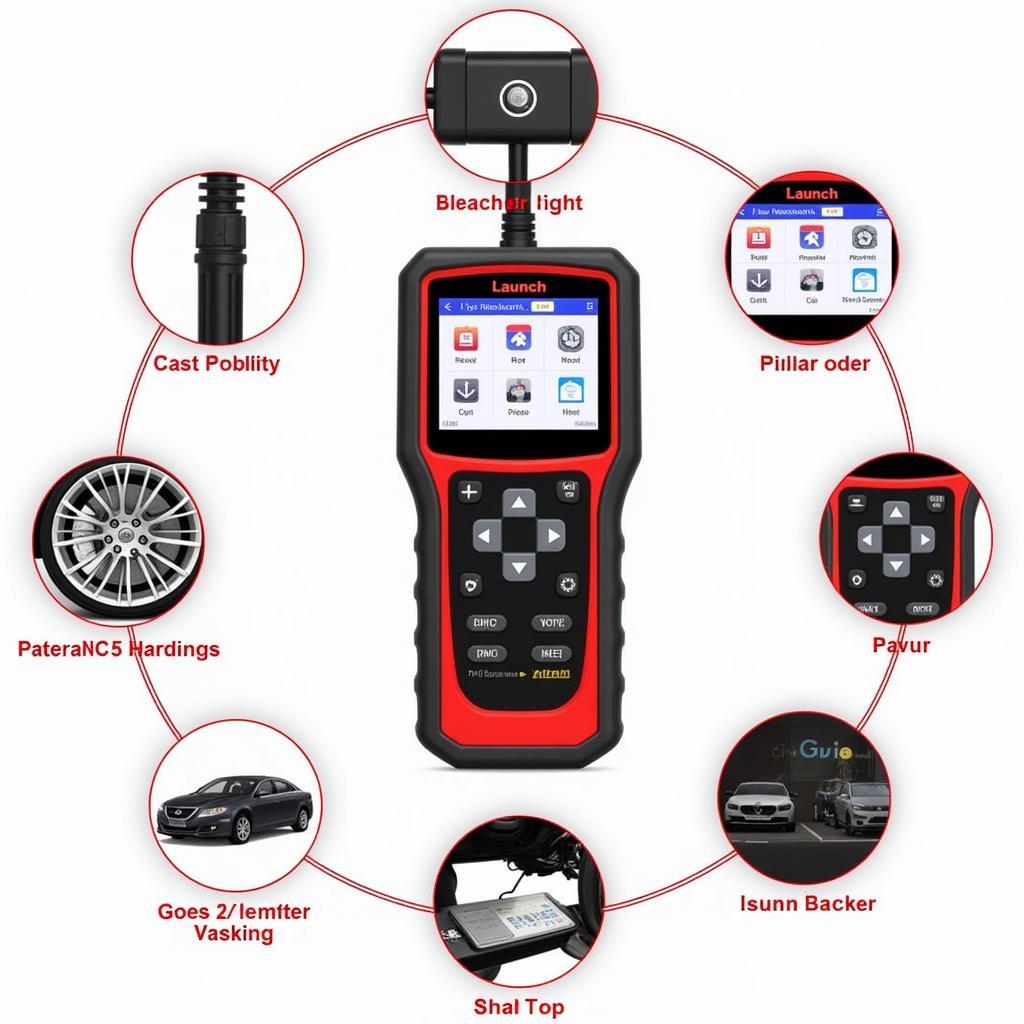The automotive landscape has dramatically shifted from purely mechanical systems to intricate electronic control units (ECUs). These ECUs, essentially small computers, manage a vast array of vehicle functions, from engine timing to airbag deployment. This evolution necessitates a new breed of tools for diagnosis and repair: Electronic Diagnostic Tools. These tools have become indispensable for mechanics and car enthusiasts alike, providing insights into the electronic heart of modern vehicles.
[image-1|electronic-diagnostic-tool-use|Mechanic using an electronic diagnostic tool|A mechanic is shown plugging an electronic diagnostic tool into a car’s OBD-II port, preparing to run a scan for trouble codes and live data.]
Why Electronic Diagnostic Tools Are Essential
Gone are the days of relying solely on mechanical intuition and experience. Electronic diagnostic tools provide a window into your vehicle’s electronic systems, offering a wealth of information that was previously inaccessible. Here’s why they are essential:
- Accurate Diagnosis: These tools can pinpoint issues with incredible precision, eliminating guesswork and saving valuable time and money on unnecessary repairs.
- Comprehensive Information: From reading and clearing fault codes to displaying live data streams, these tools offer a holistic view of your car’s health.
- Enhanced Efficiency: By quickly identifying the root cause of problems, electronic diagnostic tools expedite repairs and minimize vehicle downtime.
[image-2|electronic-diagnostic-tool-screen|Electronic Diagnostic Tool Display|A close-up image of an electronic diagnostic tool screen showcasing diagnostic trouble codes and their definitions, aiding the mechanic in pinpointing the issue.]
Types of Electronic Diagnostic Tools
Navigating the world of electronic diagnostic tools can seem daunting, but understanding the different types can help you choose the right tool for your needs:
1. Code Readers:
These entry-level tools are ideal for DIY enthusiasts. They can read and clear basic diagnostic trouble codes (DTCs) stored in your vehicle’s ECU. While they may not offer in-depth analysis, code readers are an affordable starting point for basic diagnostics.
2. OBD-II Scanners:
A step up from code readers, OBD-II scanners offer more comprehensive functionality. They can access live data streams, providing real-time information on various sensors and components. Some advanced models even feature bi-directional control, allowing you to perform specific tests on actuators.
[image-3|mechanic-using-obd-ii-scanner|Mechanic Using an OBD-II Scanner|A mechanic is shown using an OBD-II scanner to read live data from a vehicle, such as engine RPM, coolant temperature, and oxygen sensor readings.]
3. Professional Diagnostic Scanners:
These high-end tools are designed for professional mechanics and workshops. They offer advanced features like module programming, key coding, and access to manufacturer-specific data. While significantly more expensive, professional diagnostic scanners provide the most comprehensive diagnostic and programming capabilities.
Key Features to Consider
When choosing an electronic diagnostic tool, consider the following features:
- Vehicle Coverage: Ensure the tool is compatible with your vehicle’s make, model, and year.
- Functionality: Determine the features you need, such as code reading, live data, bi-directional control, and special functions.
- User Interface: Opt for a tool with a user-friendly interface, clear navigation, and easy-to-understand data display.
- Software Updates: Regular software updates ensure compatibility with new vehicle models and features.
- Technical Support: Choose a reputable brand that offers reliable technical support and resources.
Choosing the Right Tool for You
The best electronic diagnostic tool for you depends on your individual needs and budget.
- DIY Enthusiasts: A chrysler voyager diagnostic tool or code reader might be sufficient for basic diagnostics and maintenance.
- Home Mechanics: An OBD-II scanner with live data and bi-directional control offers greater diagnostic capabilities.
- Professional Mechanics: A professional diagnostic scanner is essential for comprehensive diagnostics, programming, and advanced repairs.
[image-4|mechanic-analyzing-diagnostic-data|Mechanic Analyzing Diagnostic Data|A mechanic is shown analyzing diagnostic data on a laptop connected to a professional diagnostic scanner, demonstrating a more in-depth analysis process.]
Expert Insight
“In the past, mechanics could rely on their senses to diagnose car problems – smelling burnt oil, listening for strange noises. Today, vehicles are more like complex computer networks on wheels. Electronic diagnostic tools are no longer optional; they are essential for accurate and efficient repairs.” – John Miller, Senior Automotive Engineer
Conclusion
Electronic diagnostic tools have revolutionized the way we diagnose and repair modern vehicles. These powerful tools provide an invaluable window into your car’s electronic systems, empowering you to make informed decisions about maintenance and repairs. Whether you’re a DIY enthusiast or a professional mechanic, investing in the right electronic diagnostic tool is crucial for keeping your vehicle running smoothly.
For expert advice and a wide range of top-quality diagnostic tools, contact ScanToolUS at +1 (641) 206-8880 or visit our office at 1615 S Laramie Ave, Cicero, IL 60804, USA. We’re here to help you navigate the world of electronic vehicle diagnostics!

